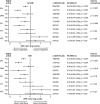Cladribine vs other drugs in MS: Merging randomized trial with real-life data
- PMID: 32801167
- PMCID: PMC7641098
- DOI: 10.1212/NXI.0000000000000878
Cladribine vs other drugs in MS: Merging randomized trial with real-life data
Abstract
Objective: Cladribine tablets were tested against placebo in randomized controlled trials (RCTs). In this study, the effectiveness of cladribine vs other approved drugs in patients with relapsing-remitting MS (RRMS) was compared by matching RCT to observational data.
Methods: Data from the pivotal trial assessing cladribine tablets vs placebo (CLARITY) were propensity score matched to data from the Italian multicenter database i-MuST. This database included 3,150 patients diagnosed between 2010 and 2018 at 24 Italian MS centers who started a disease-modifying drug. The annualized relapse rate (ARR) over 2 years from treatment start and the 24-week confirmed disability progression were compared between patients treated with cladribine and other approved drugs (interferon, glatiramer acetate, fingolimod, natalizumab, and dimethyl fumarate), with comparisons with placebo as a reference. Treatment effects were estimated by the inverse probability weighting negative binomial regression model for ARR and Cox model for disability progression. The treatment effect has also been evaluated according to baseline disease activity.
Results: All weighted baseline characteristics were well balanced between groups. All drugs tested had an effect vs placebo close to that detected in the RCT. Patients treated with cladribine had a significantly lower ARR compared with interferon (relapse ratio [RR] = 0.48; p < 0.001), glatiramer acetate (RR = 0.49; p < 0.001), and dimethyl fumarate (RR = 0.6; p = 0.001); a similar ARR to that with fingolimod (RR = 0.74; p = 0.24); and a significantly higher ARR than natalizumab (RR = 2.13; p = 0.014), confirming results obtained by indirect treatment comparisons from RCTs (network meta-analyses). The relative effect of cladribine tablets 10 mg (cumulative dose 3.5 mg/kg over 2 years) was higher in patients with high disease activity vs all treatments except fingolimod and natalizumab. Effects on disability progression were largely nonsignificant, probably due to lack of power for such analysis.
Conclusion: In patients with RRMS, cladribine tablets showed lower ARR compared with matched patients who started interferon, glatiramer acetate, or dimethyl fumarate; was similar to fingolimod; and was higher than natalizumab. The beneficial effect of cladribine tablets was generally amplified in the subgroup of patients with high disease activity.
Classification of evidence: This study provides Class III evidence that for patients with RRMS, cladribine-treated patients had lower ARR compared with interferon, glatiramer acetate, or dimethyl fumarate; similar ARR compared with fingolimod; and higher ARR compared with natalizumab.
Copyright © 2020 The Author(s). Published by Wolters Kluwer Health, Inc. on behalf of the American Academy of Neurology.
Figures


Similar articles
-
Immunomodulators and immunosuppressants for relapsing-remitting multiple sclerosis: a network meta-analysis.Cochrane Database Syst Rev. 2024 Jan 4;1(1):CD011381. doi: 10.1002/14651858.CD011381.pub3. Cochrane Database Syst Rev. 2024. PMID: 38174776 Free PMC article. Review.
-
Immunomodulators and immunosuppressants for multiple sclerosis: a network meta-analysis.Cochrane Database Syst Rev. 2013 Jun 6;(6):CD008933. doi: 10.1002/14651858.CD008933.pub2. Cochrane Database Syst Rev. 2013. PMID: 23744561 Review.
-
Comparative effectiveness and cost-effectiveness of natalizumab and fingolimod in rapidly evolving severe relapsing-remitting multiple sclerosis in the United Kingdom.J Med Econ. 2024 Jan-Dec;27(1):109-125. doi: 10.1080/13696998.2023.2293379. Epub 2023 Dec 26. J Med Econ. 2024. PMID: 38085684
-
Immunomodulators and immunosuppressants for relapsing-remitting multiple sclerosis: a network meta-analysis.Cochrane Database Syst Rev. 2015 Sep 18;2015(9):CD011381. doi: 10.1002/14651858.CD011381.pub2. Cochrane Database Syst Rev. 2015. Update in: Cochrane Database Syst Rev. 2024 Jan 4;1:CD011381. doi: 10.1002/14651858.CD011381.pub3. PMID: 26384035 Free PMC article. Updated. Review.
-
Adverse effects of immunotherapies for multiple sclerosis: a network meta-analysis.Cochrane Database Syst Rev. 2023 Nov 30;11(11):CD012186. doi: 10.1002/14651858.CD012186.pub2. Cochrane Database Syst Rev. 2023. PMID: 38032059 Review.
Cited by
-
Five-year efficacy outcomes of ocrelizumab in relapsing multiple sclerosis: A propensity-matched comparison of the OPERA studies with other disease-modifying therapies in real-world lines of treatments.J Cent Nerv Syst Dis. 2024 Sep 13;16:11795735241260563. doi: 10.1177/11795735241260563. eCollection 2024. J Cent Nerv Syst Dis. 2024. PMID: 39290861 Free PMC article.
-
Magnetic Resonance Imaging Evidence Supporting the Efficacy of Cladribine Tablets in the Treatment of Relapsing-Remitting Multiple Sclerosis.CNS Drugs. 2024 Apr;38(4):267-279. doi: 10.1007/s40263-024-01074-3. Epub 2024 Mar 15. CNS Drugs. 2024. PMID: 38489020 Free PMC article. Review.
-
Holistic, Long-Term Management of People with Relapsing Multiple Sclerosis with Cladribine Tablets: Expert Opinion from France.Neurol Ther. 2024 Jun;13(3):503-518. doi: 10.1007/s40120-024-00589-7. Epub 2024 Mar 15. Neurol Ther. 2024. PMID: 38488979 Free PMC article. Review.
-
Long-term clinical outcomes in patients with multiple sclerosis who are initiating disease-modifying therapy with natalizumab compared with BRACETD first-line therapies.Ther Adv Neurol Disord. 2024 Feb 26;17:17562864231221331. doi: 10.1177/17562864231221331. eCollection 2024. Ther Adv Neurol Disord. 2024. PMID: 38414723 Free PMC article.
-
Practical Guidance on the Use of Cladribine Tablets in the Management or Relapsing Multiple Sclerosis: Expert Opinion from Qatar.Degener Neurol Neuromuscul Dis. 2023 Dec 13;13:81-88. doi: 10.2147/DNND.S433459. eCollection 2023. Degener Neurol Neuromuscul Dis. 2023. PMID: 38105885 Free PMC article. Review.
References
-
- Thompson AJ, Baranzini SE, Geurts J, et al. . Multiple sclerosis. Lancet 2018;391:1622–1636. - PubMed
-
- Baker D, Pryce G, Herrod SS, Schmierer K. Potential mechanisms of action related to the efficacy and safety of cladribine. Mult Scler Relat Disord 2019;30:176–186. - PubMed
-
- Giovannoni G, Comi G, Cook S, et al. . CLARITY Study Group. A placebo-controlled trial of oral cladribine for relapsing multiple sclerosis. N Engl J Med 2010;362:416–426. - PubMed
-
- Giovannoni G, Soelberg Sorensen P, Cook S, et al. . Safety and efficacy of cladribine tablets in patients with relapsing-remitting multiple sclerosis: results from the randomized extension trial of the CLARITY study. Mult Scler 2018;24:1594–1604. - PubMed
-
- Saccà F, Lanzillo R, Signori A, et al. . Determinants of therapy switch in multiple sclerosis treatment-naive patients: a real-life study. Mult Scler 2019;25:1263–1272. - PubMed
Publication types
MeSH terms
Substances
LinkOut - more resources
Full Text Sources
Research Materials
